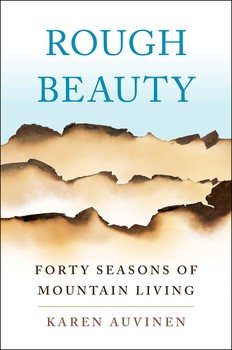 Winter on Overland Mountain––some 3,000 feet above Boulder, Colorado––could be exhausting, writes Karen Auvinen. Snow fell “a foot at a time” and temperatures could plummet to twenty-five-degrees-below zero. Winds “howled and clawed at the cabin, rattling the gass panes like a live thing.”
Winter on Overland Mountain––some 3,000 feet above Boulder, Colorado––could be exhausting, writes Karen Auvinen. Snow fell “a foot at a time” and temperatures could plummet to twenty-five-degrees-below zero. Winds “howled and clawed at the cabin, rattling the gass panes like a live thing.”
Surviving winter, however, was by no means her greatest challenge.
Auvinen’s intimate and unforgettable debut memoir, Rough Beauty: Forty Seasons of Mountain Living, tells of the decade or so she spent on the outskirts of civilization. Like Cheryl Strayed’s Wild, Rough Beauty offers a glimpse into a life that’s pared down to its essentials, open to unexpected, even profound, change.
Auvinen was nearly forty when she began living in a rustic cabin about four miles outside the tiny town of Jamestown, Colorado. She supported herself by running a rural postal route, teaching writing at a nearby community college, and cooking once a week at the Mercantile Cafe––the town’s only business establishment.
Auvinen depicts her younger self as awkward and a bit prickly, “[p]roud to be called ‘fearless’ and ‘tough,’” she writes. When her first rented cabin burned down––leaving nothing but her truck, her beloved dog (a semi-feral husky named Elvis) and the clothes on her back––the Jamestown community “arrived like the cavalry.” One friend took her shopping for clothing essentials, another bought new supplies for Elvis, and customers on her postal route left her envelopes of cash. The town even held a benefit in her honor. But she couldn’t abide the attention or the goodwill. “I roasted on the twin spits of chagrin and embarrassment,” Auvinen writes, “…more uneasy with condolences and well wishes than I would have been with condemnation and blame.” She loaded up Elvis and headed to Utah for a few days of solitary camping.
Who among us hasn’t at least considered a life of solitude? My own attempt, decades ago, was short-lived and humiliating. One autumn, shortly after college, I decided to stay in a somewhat isolated, bare-bones house on Cape Cod. I’d envisioned long, peaceful days spent reading and writing, but instead found myself becoming unmoored without the comforting noises of summer. At night I’d wrap myself in a blanket, listen to the tick of an old shelf clock and recall in vivid detail every horror story I’d ever been told. I didn’t last a week.
Auvinen’s memoir purports to focus on her years of relative isolation on the mountain. But it’s the stories she tells of her childhood and her teenage years that are most affecting; without seeming melodramatic, they have a real sense of poignancy and immediacy.
An irreverent, headstrong kid, “I licked the sidewalk because I liked the taste of dirt,” says Auvinen, who grew up in a family where women were “parsley on the plate––accessories or helpmates.” Her father, an Air Force career man, ruled the family with tyranny and occasional violence.
Auvinen writes of her father’s decision, during her middle-school years, to relocate the family to Hawaii, and to euthanize the family dog rather than bringing her along. Before the dog’s final trip to the vet, he carried the struggling animal outside and tried to fit her into a wooden box he’d chosen for her burial. Karen watched in horror: “I couldn’t control the sound coming from my chest––the guttural, animal wail of grief.”
Karen began marshalling considerable will against her father’s bullying and “forged a dark armor to protect me and keep others at bay.” Before entering graduate school––in a symbolic rejection of her father––she changed her last name. He threatened to track her down. She eluded him by quitting her job and moving into a tent in the woods. She and her father would not speak for another decade.
Living alone, in relatively rough conditions, seemed to suit her. “My preference was for the earth, with its rough beauty, its inscrutability, its mixture of shit and muck,” she writes.
Gradually, Auvinen began to feel grounded by the rhythm of the seasons and to sense a slow “unraveling” inside herself. Perhaps most importantly, she was both buoyed and steadied by the stubborn companionship of Elvis. For years, even as she avoided friends and family during the holidays, she relished cooking dinners––roast chicken, perhaps, or rosemary lamb––to share with her dog. Opening her heart to Elvis, she later realized, was life-changing.
When Auvinen first set out to live on Overland Mountain, she believed that her “commitment was not to a person but to a place: “…I placed my bet on landscape, putting all my chips on wildness.” But for all its focus on mountain living, what this memoir really seems to be about is the difficult terrain of human love and connection.
___
Tucker Coombe writes about nature, education and dogs, and lives in Cincinnati.

1 comment
Ron J Stefanski says:
Jul 30, 2018
Coombe provides a prescient review that distills the narrative arc of Auvinen’s memoir into its most essential truth— that great memoirs are rarely exclusively about the story at hand. In this case, traversing mountain life in relative solitude is only the backdrop for a more reflective hike into the more rugged terrain of human relationships and the sometimes harrowing climbs and jumps they force us to navigate.